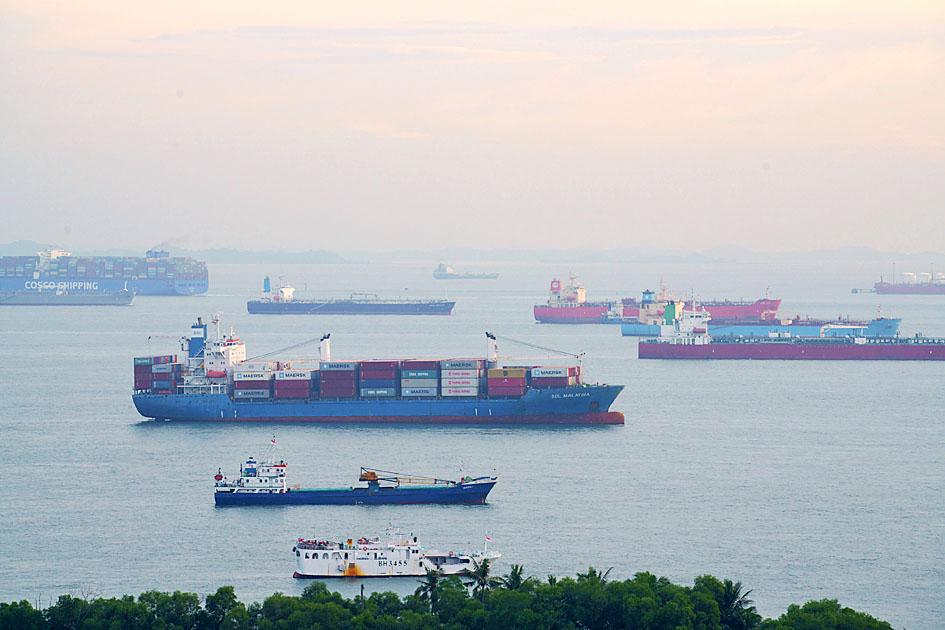Buoyed by rising freight rates, bulk shipper Wisdom Marine Lines Co (慧洋海運) on Friday reported a record net profit of NT$8.24 billion (US$294.07 million) for last year, up 7,300 percent from NT$111.41 million a year earlier.
Consolidated revenue rose 60.56 percent year-on-year to NT$19.17 billion, it said in a statement.
The figures were slightly better than the NT$8.19 billion in net profit and NT$19.16 billion in revenue estimated by Fubon Securities Investment Services Co (富邦投顧).

Photo: Bloomberg
Earnings per share were NT$11.05, compared with NT$0.15 in 2020 and Fubon’s estimate of NT$10.98.
As operating costs rose only 4 percent to NT$10.72 billion, gross margin improved to 44.09 percent last year, from 13.88 percent a year earlier.
Wisdom attributed the improvement in profitability to rising freight rates and higher cargo demand due to congestion at seaports worldwide.
The average daily freight rate for handysize vessels — a small to middle-sized bulk carrier with a deadweight of 24,000 to 40,000 tonnes — once peaked at US$37,000 last year, benefiting Wisdom, which has more than 40 handysize ships among its fleet of 137 vessels, it said.
The Baltic Dry Index, which tracks the freight rates of all types of ships, mildly rebounded last month. It closed at 2,076 points yesterday, up from 1,381 points at the end of January, but still lower than a peak of 5,500 points in October last year.
Wisdom remains upbeat about freight rates this year and expects shipping demand to outweigh supply, it said.
“The number of newly built vessels has been at a comparatively low level over the past five years, so the overall cargo capacity would not increase quickly in the near term,” its statement said. “However, demand for cargo would remain strong, as China would resume imports after the Winter Olympics and South America is to enter its grain harvest season.”
Wisdom reiterated that it would boost freight rates by 25 percent when it renews contracts for 60 vessels this year, it said.
The company last year took delivery of seven new vessels and disposed of 10 vessels. It expects to receive six vessels this year.

Taiwan Semiconductor Manufacturing Co (TSMC, 台積電) yesterday said that its investment plan in Arizona is going according to schedule, following a local media report claiming that the company is planning to break ground on its third wafer fab in the US in June. In a statement, TSMC said it does not comment on market speculation, but that its investments in Arizona are proceeding well. TSMC is investing more than US$65 billion in Arizona to build three advanced wafer fabs. The first one has started production using the 4-nanometer (nm) process, while the second one would start mass production using the

A TAIWAN DEAL: TSMC is in early talks to fully operate Intel’s US semiconductor factories in a deal first raised by Trump officials, but Intel’s interest is uncertain Broadcom Inc has had informal talks with its advisers about making a bid for Intel Corp’s chip-design and marketing business, the Wall Street Journal reported, citing people familiar with the matter. Nothing has been submitted to Intel and Broadcom could decide not to pursue a deal, according to the Journal. Bloomberg News earlier reported that Taiwan Semiconductor Manufacturing Co (TSMC, 台積電) is in early talks for a controlling stake in Intel’s factories at the request of officials at US President Donald Trump’s administration, as the president looks to boost US manufacturing and maintain the country’s leadership in critical technologies. Trump officials raised the

‘SILVER LINING’: Although the news caused TSMC to fall on the local market, an analyst said that as tariffs are not set to go into effect until April, there is still time for negotiations US President Donald Trump on Tuesday said that he would likely impose tariffs on semiconductor, automobile and pharmaceutical imports of about 25 percent, with an announcement coming as soon as April 2 in a move that would represent a dramatic widening of the US leader’s trade war. “I probably will tell you that on April 2, but it’ll be in the neighborhood of 25 percent,” Trump told reporters at his Mar-a-Lago club when asked about his plan for auto tariffs. Asked about similar levies on pharmaceutical drugs and semiconductors, the president said that “it’ll be 25 percent and higher, and it’ll

CHIP BOOM: Revenue for the semiconductor industry is set to reach US$1 trillion by 2032, opening up opportunities for the chip pacakging and testing company, it said ASE Technology Holding Co (日月光投控), the world’s largest provider of outsourced semiconductor assembly and test (OSAT) services, yesterday launched a new advanced manufacturing facility in Penang, Malaysia, aiming to meet growing demand for emerging technologies such as generative artificial intelligence (AI) applications. The US$300 million facility is a critical step in expanding ASE’s global footprint, offering an alternative for customers from the US, Europe, Japan, South Korea and China to assemble and test chips outside of Taiwan amid efforts to diversify supply chains. The plant, the company’s fifth in Malaysia, is part of a strategic expansion plan that would more than triple